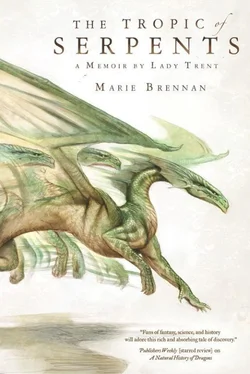As it transpired, though, her recriminations were at least drawing on fresh material. My mother said, “Isabella. What is this nonsense I hear about you going to Eriga?”
I have been known to bypass the niceties of small talk, and ordinarily I am grateful for it in others. In this instance, however, it had the effect of an arrow shot from cover, straight into my brain. “What?” I said, quite stupidly—not because I failed to understand her, but because I had no idea how she had come to hear of it.
“You know perfectly well what I mean,” she went on, relentlessly. “It is absurd, Isabella. You cannot go abroad again, and certainly not to any part of Eriga. They are at war there!”
I sought my chair once more, using the delay to regain my composure. “That is an exaggeration, Mama, and you know it. Bayembe is not at war. The mansa of Talu dares not invade, not with Scirling soldiers helping to defend the borders.”
My mother sniffed. “I imagine the man who drove the Akhians out of Elerqa—after two hundred years!—dares a great deal indeed. And even if he does not attack, what of those dreadful Ikwunde?”
“The entire jungle of Mouleen lies between them and Bayembe,” I said, irritated. “Save at the rivers, of course, and Scirland stands guard there as well. Mama, the whole point of our military presence is to make the place safe.”
The look she gave me was dire. “Soldiers do not make a place safe, Isabella. They only make it less dangerous.”
What skill I have in rhetoric, I inherited from my mother. I was in no mood to admire her phrasing that day, though. Nor to be pleased at her political awareness, which was quite startling. Most Scirling women of her class, and a great many men, too, could barely name the two Erigan powers that had forced Bayembe to seek foreign—which is to say Scirling—aid. Gentlemen back then were interested only in the lopsided “trade agreement” that sent Bayembe iron to Scirland, along with other valuable resources, in exchange for them allowing us to station our soldiers all over their country, and build a colony in Nsebu. Ladies were not interested much at all.
Was this something she had attended to before, or had she educated herself upon hearing of my plans? Either way, this was not how I had intended to break the news to her. Just how I had intended to do it, I had not yet decided; I kept putting off the issue, out of what I now recognized as rank cowardice. And this was the consequence: an unpleasant confrontation in front of my sister-in-law, whose stiffly polite expression told me that she had known this was coming.
(A sudden worm of suspicion told me that Paul, too, had known. Meeting with Lord Melst, indeed. Such a shame he was out when I arrived.)
It meant, at least, that I only had to face my mother, without allies to support her in censure. I was not fool enough to think I would have had allies of my own. I said, “The Foreign Office would not allow people to travel there, let alone settle, if it were so dangerous as all that. And they have been allowing it, so there you are.” She did not need to know that one of the recurrent delays in this expedition had involved trying to persuade the Foreign Office to grant us visas. “Truly, Mama, I shall be at far more risk from malaria than from any army.”
What possessed me to say that, I do not know, but it was sheer idiocy on my part. My mother’s glare sharpened. “Indeed,” she said, and the word could have frosted glass. “Yet you propose to go to a place teeming with tropical diseases, without a single thought for your son.”
Her accusation was both fair and not. It was true that I did not think as much of my son as one might expect. I gave very little milk after his birth and had to hire a wet-nurse, which suited me all too well; infant Jacob reminded me far too much of his late namesake. Now he was more than two years old, weaned, and in the care of a nanny. My marriage settlement had provided quite generously for me, but much of that money I had poured into scientific research, and the books of our Vystrani expedition—the scholarly work under my husband’s name, and my own inane bit of travel writing—were not bringing in as much as one might hope. Out of what remained, however, I paid handsomely for someone to care for my son, and not because the widow of a baronet’s second son ought not to stoop to such work herself. I simply did not know what to do with Jacob otherwise.
People often suppose that maternal wisdom is wholly instinctual: that however ignorant a woman may be of child rearing prior to giving birth, the mere fact of her sex will afterward endow her with perfect capability. This is not true even on the grossest biological level, as the failure of my milk had proved, and it is even less true in social terms. In later years I have come to understand children from the perspective of a natural historian; I know their development, and have some appreciation for its marvellous progress. But at that point in time, little Jacob made less sense to me than a dragon.
Is the rearing of a child best performed by a woman who has done it before, who has honed her skills over the years and enjoys her work, or by a woman with no skill and scant enjoyment, whose sole qualification is a direct biological connection? My opinion fell decidedly on the former, and so I saw very little practical reason why I should not go to Eriga. In that respect, I had given a great deal of thought to the matter of my son.
Saying such things to my mother was, however, out of the question. Instead I temporized. “Matthew Camherst and his wife have offered to take him in while I am gone. Bess has one of her own, very near the same age; it will be good for Jacob to have a companion.”
“And if you die?”
The question dropped like a cleaver onto the conversation, severing it short. I felt my cheeks burning: with anger, or with shame—likely both. I was outraged that my mother should say such a thing so bluntly… and yet my husband had died in Vystrana. It was not impossible that I should do the same in Eriga.
Into this dead and bleeding silence came a knock on the door, followed shortly by the butler, salver in hand, bowing to present a card to Judith, who lifted it, mechanically, as if she were a puppet and someone had pulled the string on her arm. Confusion carved a small line between her brows. “Who is Thomas Wilker?”
The name had the effect of a low, unnoticed kerb at the edge of a street, catching my mental foot and nearly causing me to fall on my face. “Thomas Wil—what is he doing here?” Comprehension followed, tardily, lifting me from my stumble. Judith did not know him, and neither did my mother, which left only one answer. “Ah. I think he must be here to see me.”
Judith’s posture snapped to a rigid, upright line, for this was not how social calls were conducted. A man should not inquire after a widow in a house that wasn’t hers. I spared a moment to notice that the card, which Judith dropped back on the salver, was not a proper calling card; it appeared to be a piece of paper with Mr. Wilker’s name written in by hand. Worse and worse. Mr. Wilker was not, properly speaking, a gentleman, and certainly not the sort of person who would call here in the normal course of things.
I did what I could to retrieve the moment. “I do apologize. Mr. Wilker is an assistant to the earl of Hilford—you recall him, of course; he is the one who arranged the Vystrani expedition.” And was arranging the Erigan one, too, though his health precluded him from accompanying us. But what business of that could be so urgent that Lord Hilford would send Mr. Wilker after me at my brother’s house? “I should speak with him, but there’s no need to trouble you. I will take my leave.”
Читать дальше












